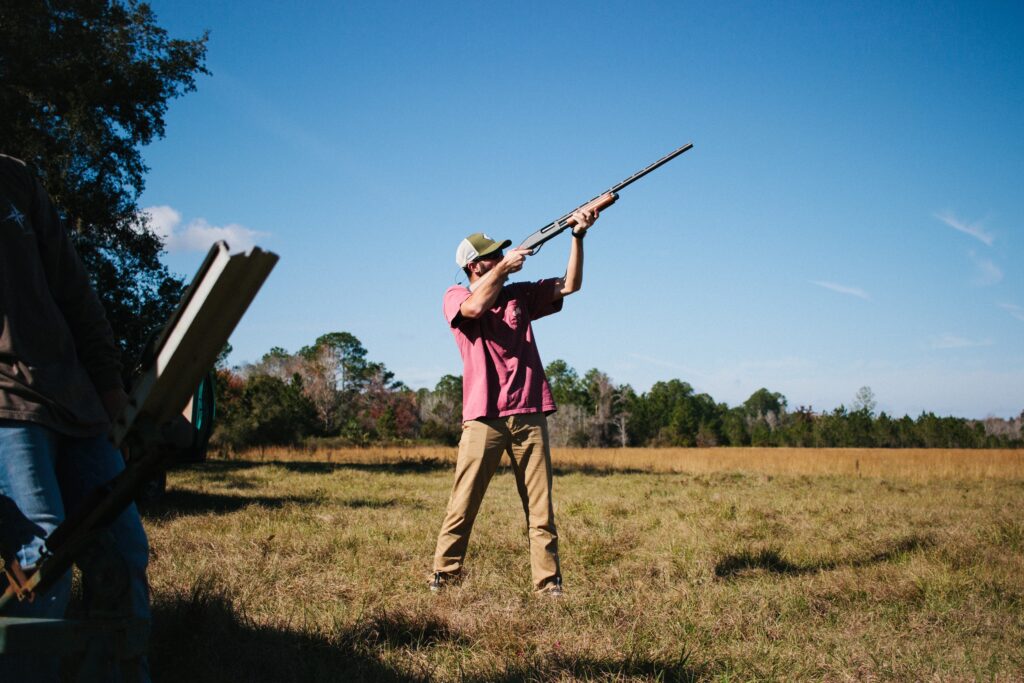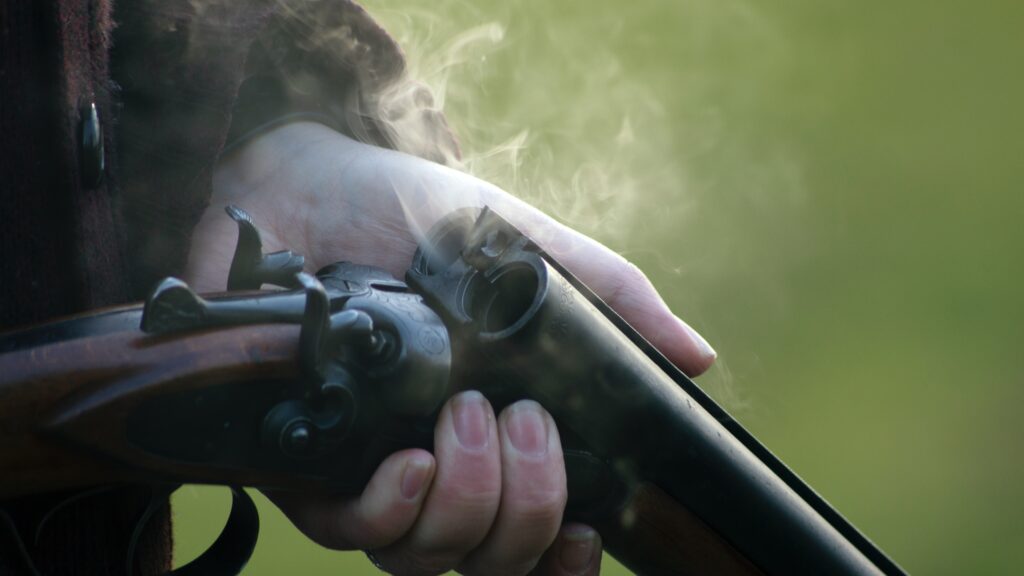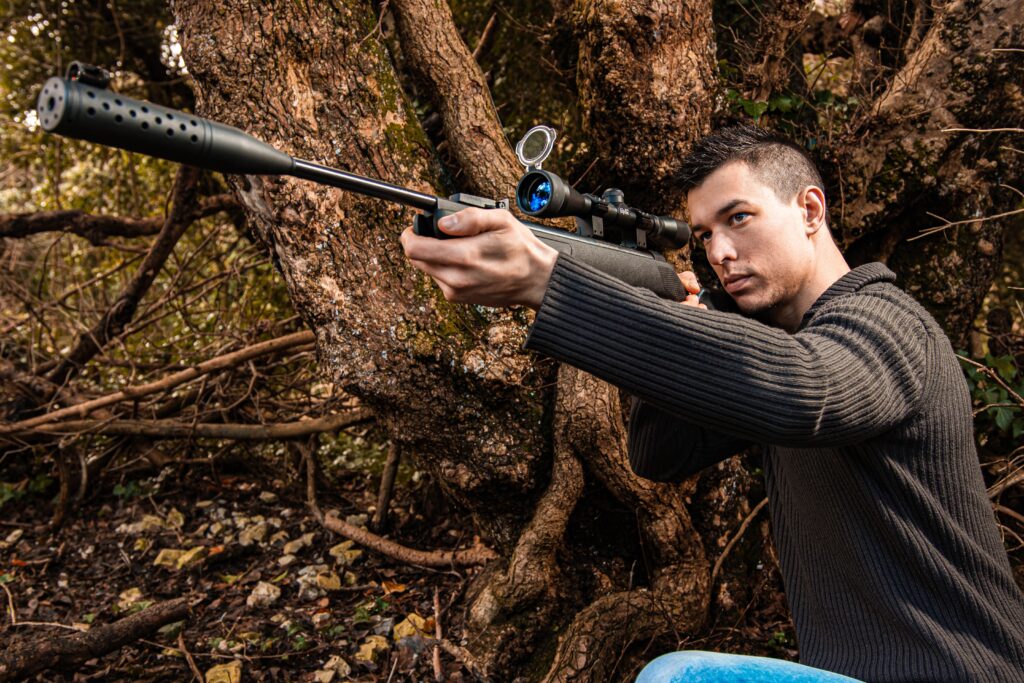As an Amazon Associate we earn from qualifying purchases.
Recreational or target shooting has become quite a popular sport for North Carolina residents. However, there are rules and enforceable legal restrictions that you must follow when engaging in gun shooting activities. Which leads me to the question, can you shoot on your property in North Carolina?
The rules and regulations that you follow depend on the local and county ordinances in North Carolina.
Some rural areas are more densely populated than others and as such, they are likely to have more restrictions on where and under which circumstances you can fire your weapons.
Be sure to always adhere to these rules when engaging in recreational firearm shooting.
Contents
Can You Shoot on Your Property in North Carolina?
Yes, shooting on your property in North Carolina is allowed as long as you are not within the city limits and are at least 250 meters away from the road or occupied buildings or homes.
You must ensure you are far away from neighboring dwellings and utility infrastructures such as electric power lines, water towers, and many more.
Some North Carolina municipalities and counties do not have regulations or laws on the books. However, you are still required to follow State, Provincial, and Federal Law.

Discharge of Firearms or Weapons
According to the gun laws of North Carolina, shooting or discharge of firearms within the corporate limits of the city.
No firearms should be used within the city limits whether a rifle, gun, pistol, spring gun, air rifle, compressed air rifle, or any weapon that discharges or impels bullets or pellets with force.
This simply means that if your residential area is within the city limits, then you are not allowed to use any type of weapon there for leisure shooting.
Additionally, it is illegal to fire a gun that is 50 meters or feet from a public road or 250 meters from an occupied building or residence.
There are also restrictions regarding specific locations such as:
- streets
- driveways
- parking lots or learning institutions
Therefore, before target shooting on your property, you must determine where your home is situated in proximity to these.
What Guns Are Illegal in North Carolina?
North Carolina allows legal permanent residents and American citizens who are above 21 years to purchase any type of gun they want. People who are above 18 years can purchase shotguns and rifles, but not handguns.
Furthermore, people who are not yet old enough to purchase guns on their own can still use other people’s guns in specific circumstances, for example, underage children who have permission from their parents.

It is a common misconception in the North Carolina State that highly dangerous weapons such as sawed-off shotguns, machine guns, or other “weapons of mass destruction” are illegal to possess for people who are outside the military.
However, it is legal to purchase these weapons as long as you have a valid National Firearms Act (NFA) permit that needs background checks and extra fees.
An NFA permit will also allow North Carolina residents to purchase otherwise illegal gun attachments such as suppressors and silencers, or shoulder stocks for their pistols. Unlike some states, North Carolina does not have laws that prohibit magazines that hold a specified number of bullets.
Discharge Law of Kannapolis, North Carolina
| Section | Description |
|---|---|
| 11-1 | Discharging firearms, etc., prohibited; exceptions. |
| a | It shall be unlawful for any person to shoot or discharge any gun, pistol, or other firearm, BB gun, air compression gun, spring gun, or other similar device which propels with force a shot, pellet, or other projectile within the municipal corporate limits of the city. |
| a(1) | It shall be unlawful for any person to shoot or discharge, by bow, crossbow, or otherwise, any arrow, or similar projectile of deadly force within the municipal corporate limits of the city. |
| b | Nothing herein shall be construed so as to prohibit: |
| b(1) | Any person from discharging any firearm in the lawful defense of his person, family, or property or pursuant to lawful directions of law enforcement officers; |
| b(2) | Any sworn law enforcement officer from discharging a firearm in the performance of official duties; |
| b(3) | Any person, corporation, or organization operating a rifle, pistol, skeet or trap range or other firing range including “turkey shoots” which range is substantially in accordance with specifications promulgated by the National Rifle Association or by an equivalent nationally recognized firearms safety authority for the type and caliber of firearm being fired; |
| b(4) | Any person using, as intended, any device used for the firing of stud cartridges, explosive rivets or similar industrial ammunition; |
| b(5) | Any person using model rockets designed to propel a model vehicle in a vertical direction; |
| b(6) | Any person using a weapon or other instrument used to fire blank ammunition for a lawful purpose; |
| b(7) | A person hunting on his own property or with the property owner, or on another’s property in their absence if he has on his person a valid North Carolina hunting license and written permission from the property owner, and a. The firearm discharged by the person hunting is a shotgun employing number seven (7) or higher shot; and b. There is a valid hunting season in effect at the time the shotgun is discharged; and c. The shotgun is not discharged within five hundred (500) feet of a dwelling house, school, church, any other occupied building, street, or road, park or recreation area or any other type of public gathering place; and d. The parcel or tract of land which the hunter owns or has permission to hunt upon is greater than fifty (50) acres in area; and e. The person discharging the shotgun exhibits reasonable regard for the safety and property of other persons. |
| b(8) | A person hunting by bow or crossbow on his own property, or with the property owner, or on another’s property in their absence if he has on his person both a valid North Carolina hunting license (or who qualify for an exemption from licensing by the state wildlife commission) and written permission from the property owner or the property owner’s authorized agent or manager and meets the following requirements: a. Hunts from a permanent or portable elevated platform of at least ten (10) feet above the ground; and b. Does not discharge a bow or crossbow from an elevated platform when within five hundred (500) feet from any property line or boundary of a dwelling house, school, church, commercial building, governmental property or other occupied building, street or road, park or recreation area or any type of public gathering place; and c.The parcel or tract of land which the hunter owns or has permission to hunt is greater than ten (10) acres in area; and d.There is a valid hunting season in effect for which the hunting license applies at the time the bow or crossbow is discharged; and e.The person discharging the bow or crossbow exercises reasonable regard for the safety and property of other persons. |
| b(9) | Any person, corporation or organization operating or using an archery range which range is substantially in accordance with the outdoor target range or field archery specifications promulgated by the National Archery Association or by an equivalent nationally recognized archery safety authority or advocate. |
| c | Any person violating the provision of this section shall, upon conviction thereof, be guilty of a misdemeanor and shall be fined or imprisoned in accordance with law. |
Damage to Property or Life
Property owners who want to target shoot on their land must take the legal restrictions, especially if they are living in a densely populated neighborhood.
However, if you have over 5,000 acres of land and you are target shooting in the middle of your property, you can do so without limitations, as long as you remember the rules for firearm safety.
Following set guidelines is important because if a bullet leaves your home and hits something like a pet animal or a human being, you may end up in jail and your rights to fire your gun again will be taken away.
Keep in mind that your defense argument of shooting on your own property will not hold up in any court. In most jurisdictions, you will still go to prison for involuntary manslaughter.
Furthermore, you may end up getting a longer sentence if you are found negligent. Therefore, you must take all necessary precautions to ensure that your leisure shooting on your North Carolina property does not break the law in any way.

Related Questions
Is It Legal to Shoot Someone on Your Property in North Carolina?
It’s legal to shoot someone on your property in North Carolina. Deadly force may be used when you’re defending your property if there’s an attacker you believe has the intent to kill, inflict serious injury, or commit a felony on your property.
How Far Can You Shoot a Gun From a House in NC?
You can shoot a gun from a house in NC as far as 300 yards from someone else’s house if you can get written permission from the owner or current resident.
Is North Carolina a Stand Your Ground State?
North Carolina is a stand-your-ground state. This removes the duty to retreat before using deadly force in any place that you have a right to be.
Conclusion
Target shooting is an enjoyable sport for many people, and aside from visiting gun ranges in North Carolina, what better way to enjoy it than within the confines of your property?
However, you must ensure that you remember how to handle your firearms safely and that you are operating within the gun laws of North Carolina to avoid getting yourself into trouble.
Before you start shooting on your North Carolina property, take the time to check your local municipal office, county offices, and state authorities for bylaws on target shooting in residential properties.
